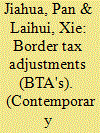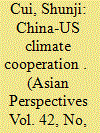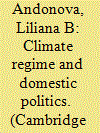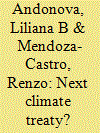| Srl | Item |
| 1 |
ID:
086723


|
|
|
|
|
| Publication |
2009.
|
| Summary/Abstract |
As the target commitment period under the Kyoto Protocol nears its end, further measures are under consideration by all the parties to the UNFCCC to have effective emission reduction that will not damage the economy. In order to set a post 2012 emission reduction target, as individual party as player in the clmate game requires others to make comparable commitments for reasons of environmental effectiveness and international competitiveness.
|
|
|
|
|
|
|
|
|
|
|
|
|
|
|
|
| 2 |
ID:
159166


|
|
|
|
|
| Summary/Abstract |
Building “a new model of major-country relations,” particularly with the United States, has become one of China's major foreign policy objectives. Yet, outside of China, the concept is often seen as an empty slogan with no practical utility. By examining both the concept of the new model of major-country relations (NMMCR) and China's climate cooperation with the United States, I argue that the concept and initiative of NMMCR—with its emphasis on a common fate and shared futures, viewed as a means of achieving cooperation rather than conflict to achieve common goals— reflects well the changing environment of the twenty-first century and is thus a positive new development in China's foreign policy.
|
|
|
|
|
|
|
|
|
|
|
|
|
|
|
|
| 3 |
ID:
085404


|
|
|
|
|
| Publication |
2008.
|
| Summary/Abstract |
The literature on climate cooperation focuses primarily on intergovernmental institutions and national policies. Few studies have examined the 'second image reversed' question: what is the impact of the international climate regime on domestic politics? This article examines the impact of the Kyoto Protocol on climate politics in Russia. Russia is an important case study both from a theoretical and policy perspective. Analytically, the case provides an opportunity to assess alternative theories of regime impact, given Russia's early scepticism about climate change and insistence on unrestrained economic growth. The study finds that the Kyoto Protocol influenced political interests in Russia first and foremost through the redistribution of resources and potential payoffs, but also through more subtle mechanisms such as capacity building and the diffusion of economic assessments. The result was a realignment of powerful domestic interests in a direction that has supported the main institutions of the climate regime and pushed for its implementation. Documenting the domestic political impacts of the Kyoto Protocol has policy implications for the conditions under which Russia and other large emerging markets focused on growth might undertake obligations to strengthen climate cooperation.
|
|
|
|
|
|
|
|
|
|
|
|
|
|
|
|
| 4 |
ID:
084676


|
|
|
|
|
| Publication |
2008.
|
| Summary/Abstract |
Scholars and policy pundits have advanced more than thirteen different designs of a climate change treaty to succeed the Kyoto Protocol. Each of these designs claims to correct the defects of the current agreement. But what kind of a treaty is likely to pass the test of international and domestic politics and negotiations? Can we learn something about the hurdles and opportunities for climate cooperation from negotiations simulations in the classroom? The paper engages these questions by analyzing an experimental course design organized around simulated negotiations of the next climate change treaty. Unlike classroom simulations which rely on hypothetical scenarios, this course sought to approximate actual domestic and international constraints within which countries negotiate. The paper details the structure of the course, the ways in which it familiarizes students with domestic and international climate politics, and the components of the negotiations module. The analysis examines the pedagogical impact and policy learning associated with the simulation and draws conclusions about the broader applicability of this approach.
|
|
|
|
|
|
|
|
|
|
|
|
|
|
|
|